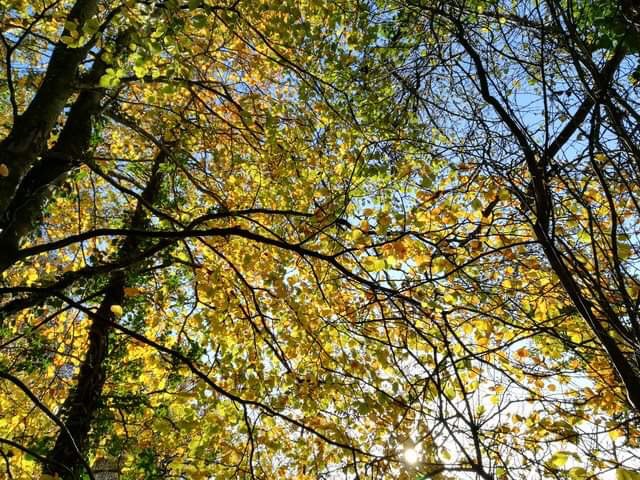On Adapting
by Rebecca Smith
When I was sixteen, my Dad fell out of a tree. He fell twelve foot and landed on the tarmac road on his back. Luckily, he had a clear enough mind to push away the roaring chainsaw that also fell from his grasp. He was taking down a branch that was hanging over a telephone wire. It was a five-minute job; he thought he’d just nip up and cut the branch. He broke his back—the bottom thoracic vertebra, otherwise known as T12. He was ordered to lie flat, in the same position, for five weeks in hospital. This, for a man whose blood, if you cut him open, would be infused with fresh air and sap, was like torture. But it worked. The bone healed and he never did a five-minute job without a harness again.
This kind of accident was thankfully rare but, in some ways, expected. My Mum has always been wary of phone calls at odd times, of phone calls from voices she doesn’t recognise. Even now, when we speak on the phone, the first thing we establish is that everyone is “ok.” She once had a phone call to tell her my brother was being airlifted to hospital—he’d slashed his calf with a chainsaw. When I broke my knee mountain boarding, I phoned her from the hospital car park. And when my brother knocked himself out on the rugby posts at school, the headteacher phoned her at work. We are aware of the risks when we take part in something that has an element of danger. Risk is part of life. But when the risk puts other people in danger, that is a very different thing.
In this immediate, all-consuming global pandemic, my Dad’s life has not changed as much as others. Or, possibly, his life has not changed as much as mine. He cannot go to the pub on a Friday for a pint anymore and any meetings he had will be cancelled. But he rarely goes to a supermarket or a shop. He does not work in an office with other people or travel to work on a train or a bus. He works in the woods, felling, planting and surveying trees. At this time of year, he plants them. He has 10,000 trees to plant this week. He may not be classed as a key worker as such—he is not a doctor, a nurse, a delivery driver. But the seasons are still turning. People who work with the land cannot stop. The lambs will be born night and day and the fields need to be ploughed. Trees will grow and bloom.
Strangely, it is usually the people who work with nature who have to stop for uncertain, anxious periods. Storms, floods, drought, Foot and Mouth. Whereas city dwellers get on and off their trains, trams or tubes, order their lunchtime coffee and go to the gym, no matter what the weather throws at them, the people who work outside are forced in when the storm makes it too risky to carry on. Will the barn still be standing in the morning? Will the saplings be washed away? But this time, while whole cities falter and fall, Dad and the other land workers can carry on quietly, cautiously.
For the rest of us it feels like our carefully planned lives are being fractured. They are cracking open and leaving the elements bare. This slowing down of the cogs is showing us how other people live and how other people behave. It shows what we value, and what we are prepared to give up. What we dread to live without. What we deem important. Is the sacrifice of staying stationary for a long time, if it will save something, someone, worth it? Of course it is. Dad lay in the same position for five weeks for his bones to fuse back together. He must have dreamt about the woods, about walking in his boots in the mud. His friend built him a contraption that enabled a book to rest on a wooden frame in his eyeline, so he did not need to hold the book above his head. Mum drove 45 minutes each way to see him every evening in the November gloom. They adapted. And then, when things got back to normal, they adapted again.
It takes a while to adjust to big changes. I felt it weeks ago when I took my son out of school. I could not stop the tears. I could not see past the utter helplessness of being stuck. Stuck inside, stuck with my two beautiful children who take up every gram of my energy and patience. The life I had been moulding into something I was proud of shattered in my hands like a clay pot.
But I did adapt. At least, I am in the process of it. My eyes adjusted to the new light and I started slowing down. And not just my actions—we didn’t need to rush to school anymore, to football, to the shops. I also slowed my mind down and I started to see a bit clearer. I started to see that this way of life isn’t too different to what my own Mum lived like thirty years ago when my brother and I were very young. We lived in a very rural area. We went to the supermarket once every two weeks. We walked and played within walking distance of our house. We made dens and collected cones. I think we must have painted and drew a lot—I know this as it seems to be the only thing I can do in peace with my own kids right now. I marvel at how my Mum did all this in her own rural isolation
I am bringing my own children up here in the suburbs. Each night, before I go to bed, I let the cat in. I open the back door and usually I can hear cars rev their engines on the road as they take the roundabout to the motorway. I can hear people somewhere, not far, just living their life. Dogs barking, doors shutting, a glass bottle dropped into a black bin. Now, when the cat curls past my feet into the kitchen, I hear nothing outside. If I close my eyes, the roads have vanished, the hundreds of other houses have gone and I can only hear what must be night. It feels like I can smell the earth turning over into spring and the earthworms rounding the soil, preparing for new growth. The buds on the trees extending out of their grey twigs. I cannot hear any creatures, but I know they are there. This is what it sounded like, felt like, when I opened my window to the night to listen for Mum coming home from seeing Dad as he lay static in hospital. That November, the earth was slowing down into hibernation, but it felt the same, like the night was holding its breath. Pausing.
We do not know how long we have with this new way of life, but we will find ways forward. I do not go to the supermarket now, unless I have to. The risk of it feels huge to me. We can make do with what we have, just like Mum did. The risk of passing an invisible death onto someone else is unthinkable. So, we adapt and start to understand the parts of our lives that have been laid bare for us to study.
When I put my two-year-old to bed, I let her switch off her own light. She didn’t like it when I turned it off. She didn’t like it when the room dropped into darkness and, for a moment, we could not see each other. It only took a beat for our eyes to adjust and for the night light she has, in the shape of a moon, to shine on her face. But she likes to be in control of the imminent darkness. She finds it easier to adjust if her fingers are on the switch. If she is in control of the brief beat of the unfathomable, she can face it head on. I can’t say I blame her.
Rebecca Smith is a writer and audio producer. She is currently studying for a Masters in Creative Writing at Glasgow University. She has two children and seems to be spending more and more time in the woods. She is on Twitter @beckorio.


